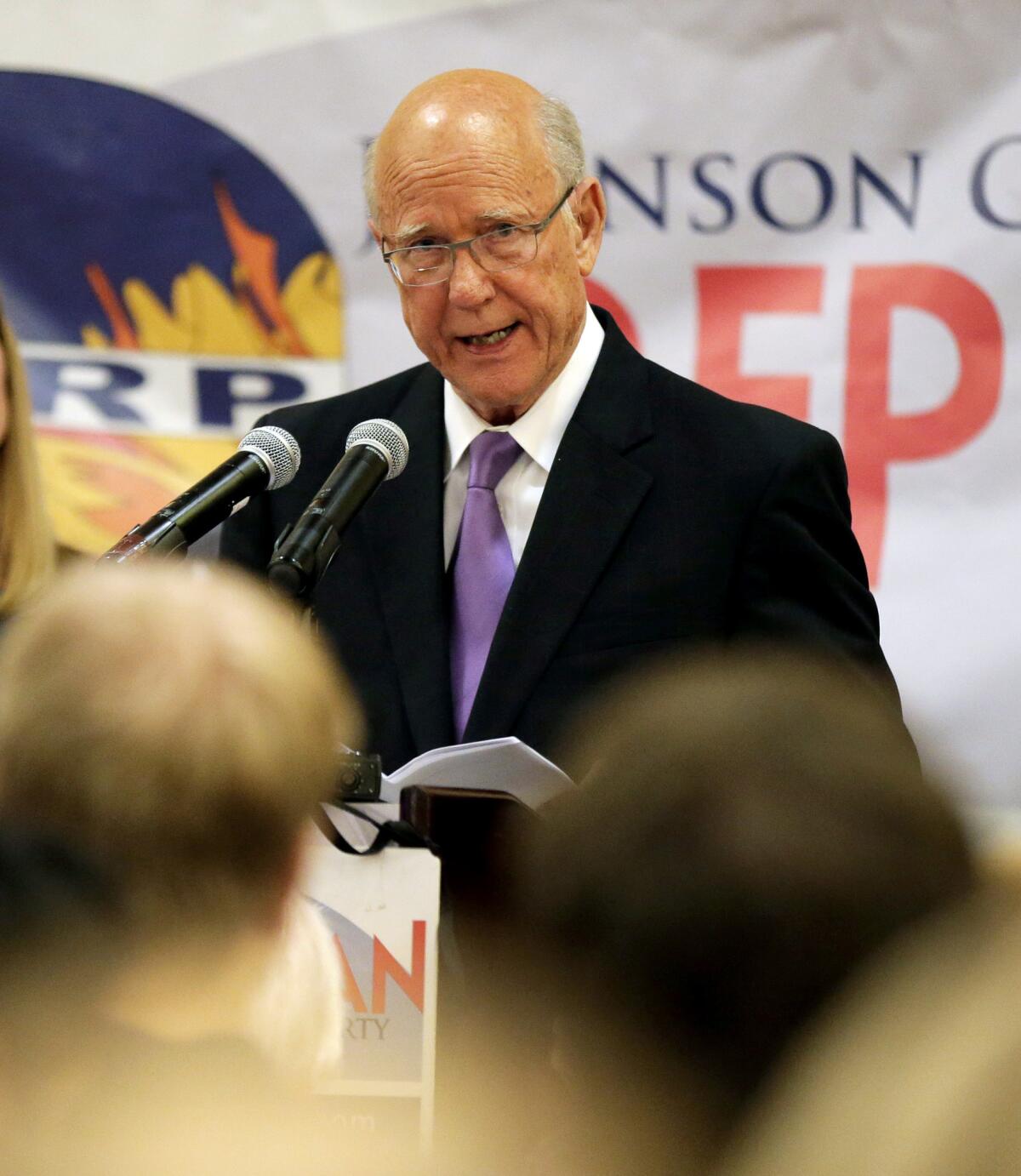Kansas suddenly emerges at center of fight for U.S. Senate

Kansas has long had an outsized place in the popular and political imagination, as the fulcrum of the fight over slavery, a hotbed of prairie populism and, not least, the home address of a whirlwind traveler named Dorothy.
Now, suddenly, Kansas is looming large in the fight for control of the United States Senate.
The abrupt withdrawal Wednesday of Democrats’ underfunded and lightly regarded Senate candidate leaves a wealthy maverick facing Republican Pat Roberts in a highly competitive one-on-one contest, meaning the GOP is going to have to work quite a bit harder if it hopes to retain the seat and seize control of the Senate in November.
The odds still favor a Republican takeover. The GOP needs to pick up six seats and appears halfway home, with likely wins in Montana, South Dakota and West Virginia. Of the remaining contests, all but two of the most competitive are being fought in states that President Obama lost in 2012.
Still, Republicans have yet to put any of those contests away, and Kansas now joins Georgia and Kentucky on the list of potentially offsetting GOP losses.
Last month, Roberts survived a rough primary against tea party challenger Milton Wolf, who portrayed the three-term incumbent as having lost touch with the state after more than 30 years in Washington. The New York Times reported that Roberts no longer owns a home in Kansas, and the senator didn’t help himself by stating in a radio interview that he returns every time he has an election opponent -- as opposed to every chance he gets.
As the two savaged one another, the well-to-do businessman and political independent Greg Orman filled the television airwaves with a flood of pox-on-both-their-houses advertising, suggesting he had little use for either major party -- a sentiment that neatly aligns with the disgust of many Kansas voters.
Sitting virtually on the sidelines was Democratic Senate hopeful Chad Taylor. A prosecutor in Topeka, he received little support from a state party keenly focused on beating GOP Gov. Sam Brownback, who is highly vulnerable for his own reasons, and defeating Secretary of State Kris Kobach, who has made a national name for himself as an anti-illegal-immigration crusader.
Faced with little money and little party backing, Taylor abruptly pulled the plug on his candidacy just before Wednesday’s 5 p.m. deadline for candidates to submit their names for the November ballot.
Republicans have cried foul. Kobach, the state’s chief elections officer, said at a Thursday press conference that Kansas law requires that Taylor’s name remain on the ballot because he failed to follow the proper procedure for withdrawal.
Kobach, a Republican, cited a Kansas statute requiring a candidate to declare he or she is “incapable” of serving if elected. Taylor’s letter simply referred to the state law, Kobach said.
A legal fight may ensue. But the practical effect could be moot: If Taylor refuses to campaign or spend money, the race would effectively become a two-way contest between Roberts and Orman.
The Kansas GOP has been bitterly divided against itself. The state has a long history of pragmatic conservatism, which Brownback swept aside with an agenda of tax-cutting and other moves that pushed the party aggressively rightward. Those who disagreed were purged in GOP primaries.
The pushback has been fierce. More than 100 Republican lawmakers, including two former lieutenant governors and several ex-legislative leaders, have endorsed Brownback’s Democratic opponent, state House Minority Leader Paul Davis.
Kobach, for his part, faces a stiff reelection fight against Jean Schodorf, a former Republican and Brownback target who was defeated in a 2012 primary. She has since become a Democrat.
All of that skirmishing may only serve to enhance Orman’s appeal; he pointedly declines to say whether he would join with Democrats or Republicans if elected to the Senate, suggesting he has little use for either major party.
Roberts remains the favorite to win, even after his unimpressive 48% showing in the Aug. 5 primary.
“He’s an incumbent and Republicans have been winning Senate races in Kansas since the 1930s,” said Bob Beatty, who teaches political science at Topeka’s Washburn University.
In fact, Kansas Republicans have won every U.S. Senate race since 1932 -- the longest such streak anywhere in the country.
Roberts “is going to have more money than you and I can imagine coming from outside groups,” Beatty went on. “They do not want to lose a Senate seat in Kansas, of all places.”
But Roberts is highly at risk. “Orman has been doing everything right,” Beatty said. “A lot of it has been good planning. He’s also been the beneficiary of some luck. In the end he may need a little more luck.”
For now at least, win or lose, Orman has given Democrats a rare bit of good news in an otherwise tough election season.
You can follow the Yellow Brick Road, or follow @markzbarabak for more on national politics
More to Read
Sign up for Essential California
The most important California stories and recommendations in your inbox every morning.
You may occasionally receive promotional content from the Los Angeles Times.











